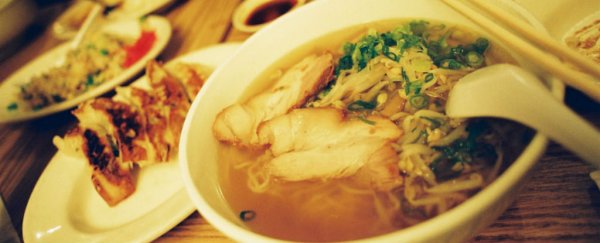Bacteria in the gut produce appetite-suppressing proteins about 20 minutes after a meal, a new study has found, suggesting that we have less control over how much we eat than we thought.
Scientists investigated the role that colonies of Escherichia coli (E.coli) bacteria living in our intestines play in what we eat. They discovered that the proteins these bacteria release when they've had enough nutrients influence the signals sent between the gut and the brain, and can even activate appetite-related neurons to make you feel full.
"There are so many studies now that look at microbiota composition in different pathological conditions, but they do not explore the mechanisms behind these associations," said one of the researchers, Sergueï Fetissov from Rouen University in France. "Our study shows that bacterial proteins from E. coli can be involved in the same molecular pathways that are used by the body to signal satiety, and now we need to know how an altered gut microbiome can affect this physiology."
When we couldn't possibly fit in another slice of pie, it's not because our stomach and intestines have been stretched to the limit. Turns out it's more likely due to our gut bacteria letting us know that they've had their fill and would like the nutrient tap to be switched off, thank you very much.
Fetissov and his colleagues came to this conclusion when analysing the proteins produced by E. coli colonies living in the guts of mice and rats. At around 20 minutes after a meal, the bacteria started producing different kinds of proteins than they were before. Which is interesting, because in humans, this is around the time when we get that feeling of fullness and satisfied sleepiness after a big meal.
The researchers isolated these after-meal proteins, called ClpB, and injected them into mice to see if an increased dose would affect their appetites. They found that regardless of whether the mice had been eating a normal or restricted diet, they all displayed a diminished appetite and ended up eating less.
Publishing the the journal Cell Metabolism, the team says the proteins released by 'full' bacteria stimulated the release of a hormone called peptide YY, which has been linked to a feeling of satiety. They also found that the ClpB proteins increased the firing of neurons in the brain that are associated with a reduce appetite.
This isn't the first time researchers have found evidence of the role bacteria play in appetite regulation, but why do they 'care' about how much we eat?
Well, we might be carrying around an incredible amount of microbes inside and on the surface of our bodies, but it's in everyone's interest that a certain balance be held in check. When populations of bacteria flare up or die out, it can cause all kinds of health problems that neither us or our microscopic hangers-on need.
With this in mind, it appears that the E. coli populations in our intestines keep careful tabs on their numbers. For all those lost in our excrement, the remaining bacteria divide and replicate themselves to fill the gap. Fetissov explains to Brian Handwerk over at Smithsonian.com:
"It looks like it's not the host animal that regulates that number, but that once bacteria multiply to a certain number, they will stop growing. We provide the nutrients to these bacteria, and they will produce, more or less, a billion more bacteria and then they will stop growing.
Why they stop after producing about 1 billion, I have no idea. But in only 20 minutes they produce this new 1 billion bacteria and then they start producing new proteins that have some inhibiting effect on appetite."
Makes you feel like even more of a big, dumb animal than you did before, right? It might be kind of embarrassing that tiny bacteria appear to be having a rather large say in how much we eat and when, but there is some good news.
Not only is there the possibility of one day treating obese patients with extra doses of ClpB, but by better understanding the relationship between us, our gut bacteria, and our food, we could get to the bottom of why so many of us are prone to overeating.
So the next time you muster the strength to say no to a slice of dessert you really don't need, remember to thank your E. coli overlords for their service.
